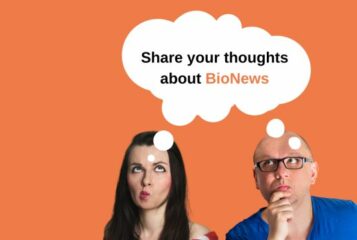We publish BioNews issue 450 as the new UK Human Fertilisation and Embryology Bill heads from the Lords to the House of Commons. A lot has happened in the fields of human genetics, assisted reproduction and embryo research since BioNews 400, including the rejuvenation of PET! A year on, we have our full complement of staff. PET's Director Sarah Norcross and Communications Officer Sandy Starr are in the thick of it, having run two influential debates already this year, with two more due to take place by the end of May. As always, BioNews has brought you the relevant news and comment each week. Editors Dr Jess Buxton and Dr Kirsty Horsey and the BioNews volunteers they guide are doing a great job, and it is a pleasure to report the successful launch of BioNews internships this year in association with University College London. Continuing the educational theme, Ailsa Stevens is writing the schools' science packs for the Jeans for Genes appeal and booklets for the Galton Institute.
As some UK leaders of the Roman Catholic faith use their Easter message to criticise the new Human Fertilisation and Embryology Bill as a 'monstrous attack on human rights, human dignity and human life', it is worth remembering that 2008 is the 30th anniversary of the birth of Louise Brown, the world's first baby born afterIVF thanks to the pioneering research of Britain's Bob Edwards and the late Patrick Steptoe. IVF has brought joy to millions of couples challenged by sub-fertility and, in the last18 years through PGD, the restoration of reproductive confidence to families threatened by genetic disease. This is not, of course, to say there are no sensitive issues to debate in the new Bill. Many of these have been highlighted in reports and commentaries in BioNews over the last few years leading up to the new Bill.
So what is the role of PET and BioNews in all this? It is primarily to inform these debates and others that arise in the fields of human genetics, reproduction and stem cell research. People are entitled to their own personal beliefs, but not entitled to their own personal facts. Life does not begin at conception - livingness per se sails through from the previous generation in the form of that fully functioning cell, the ovum. We all have direct cellular continuity with the origin(s) of life on this planet. Your life as opposed to someone else's life is a different concept that relates to personhood, the origins of which are indeed open to debate. DNA is not the molecule of life, as it is sometimes called - it is the molecule of hereditary difference. Individual people cannot be defined by a unique combination of their DNA and the genes it encodes, as demonstrated by identical twins - unless of course you don't regard a co-twin as an individual person.
The human genome is not the only genome within us - to stay alive we need a vast number of bacteria in our gut each with its genome. All cells of our body have many mitochondria in the cytoplasm that surrounds the nucleus. Mitochondria are tiny energy-producing structures vital to cell function that have their own DNA molecule. Evolutionarily they are enslaved primitive bacteria with their own genetic code. A type of assisted conception under development for families suffering mitochondrial diseases so as to avoid transmission of mutant mitochondrial DNA does not create a child with three parents any more than a kidney transplant creates a person with four parents! However, many scientific 'facts' are provisional and certainly there are many examples of assertions by scientists that have been proved wrong in time (the impossibility of cloning sheep, for example), but that is no reason to ignore the scientific evidence. This constitutes a crucial part of the deliberations of MPs during the passage of the new Bill. Careful regulation of research and monitoring of new treatments once introduced after clinical trials is proving the best way forward.
It is not surprising that genetics and reproduction throw up ethical tensions. They go to the heart of life, love, families, health and disease. Conflict between two basic ethical principles commonly arises. The idea of autonomy can be tricky in genetics - there is a real sense in which genes belong to the family and not just the individual. Resolution of these ethical tensions can be difficult in theory, even more so in practice. But the families threatened by genetic disease are often obliged to make a decision one way or the other and with that experience comes, in my view, some real moral authority. PET debates and BioNews will continue to provide a platform from which their views can be expressed and heard.
PET arose out of the need for informed comment and debate on assisted reproduction and genetics at the time of the first Human Fertilisation and Embryology Act over 15 years ago. As the science in these fields advanced so we extended our coverage to include stem cells, which are now pointing the way to a whole new scientific discipline of re-programmable biology that has huge implications for the treatment of disease. A thriving PET and BioNews are needed more than ever, so join the debate.




Leave a Reply
You must be logged in to post a comment.